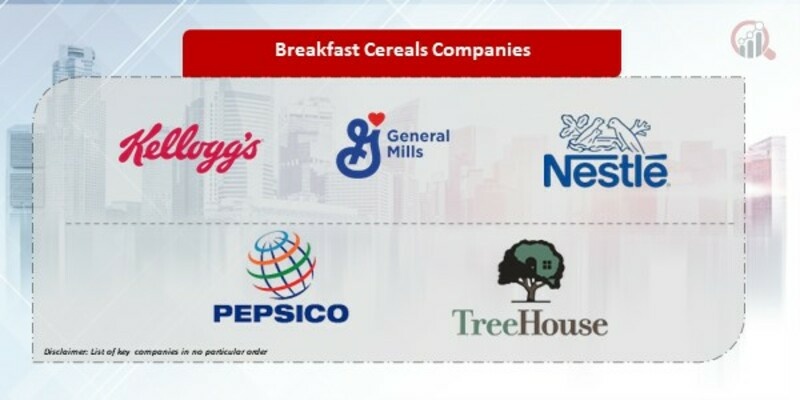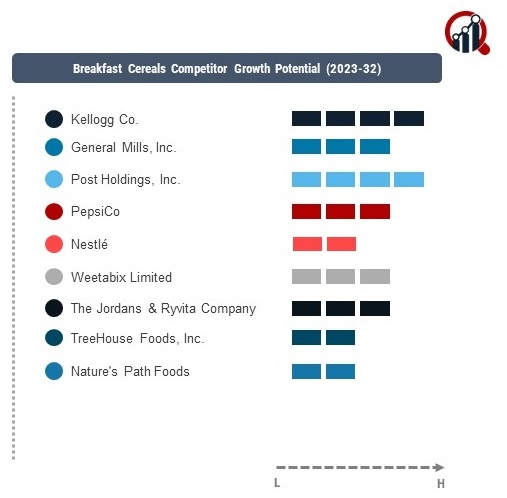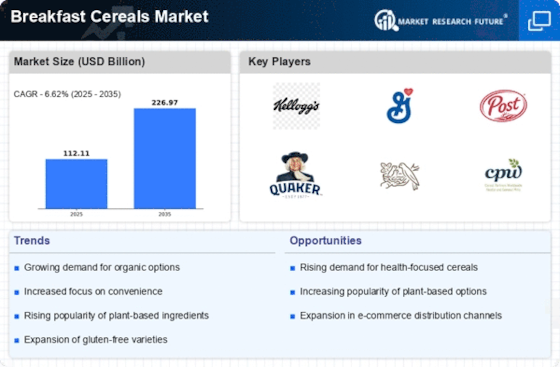Top Industry Leaders in the Breakfast Cereals Market

Strategies Adopted by Breakfast Cereals Key Players
The breakfast cereals market is marked by a competitive landscape where key players strive to secure their positions in a market driven by consumer preferences for convenient and nutritious breakfast options.
Leading the charge in this sector are
- Kellogg Co. (US),
- General Mills, Inc. (US),
- Post Holdings, Inc. (US)
- PepsiCo (US),
- Nestlé (Switzerland),
- Weetabix Limited (UK)
- The Jordans & Ryvita Company (UK).
- TreeHouse Foods, Inc. (US), and
- Nature's Path Foods (Canada
Strategies adopted by key players reflect the industry's dynamism and the necessity to stay ahead in a highly competitive market. Kellogg Company has consistently focused on product innovation and diversification, introducing new cereals and adapting to changing consumer preferences for healthier and on-the-go breakfast choices. General Mills, Inc. has leveraged its well-known brands and expanded its product lines to include healthier and organic options, aligning with the growing trend towards wellness. Nestle S.A. has placed a strong emphasis on sustainability and responsible sourcing, addressing consumer concerns about the environmental impact of food production. Post Holdings, Inc. has pursued a strategy of acquiring niche and innovative brands to broaden its portfolio, while PepsiCo, Inc. has capitalized on its global presence and marketing prowess to maintain a competitive edge.
Market share analysis in the breakfast cereals industry is influenced by various factors, with product quality, brand loyalty, and distribution capabilities playing pivotal roles. Key players vie for shelf space in retail outlets and work to secure strategic partnerships to enhance their market reach. Understanding and adapting to shifting consumer preferences, including preferences for healthier ingredients and convenient packaging, are essential for maintaining and expanding market share. The ability to offer a diverse range of cereals that cater to different dietary needs and preferences is also crucial in this competitive landscape.
Market Share Analysis Factors:
In the ever-evolving breakfast cereals market, new and emerging companies are making their mark, introducing innovative products and challenging the market dominance of established players. Companies like Nature's Path Foods, Inc. and Earnest Eats have gained traction by focusing on organic, non-GMO, and nutritionally dense cereals, resonating with health-conscious consumers seeking alternatives to traditional offerings. These emerging players often bring agility and niche market focus, providing a fresh perspective and driving innovation in the industry.
Industry Trends:
Industry news and current investment trends indicate a collective effort among key players to address changing consumer habits and invest in areas such as sustainability and digital marketing. Investments in research and development are prevalent, with companies seeking to introduce new flavors, formats, and health-oriented cereals. Strategic partnerships, mergers, and acquisitions continue to be a significant trend, enabling companies to diversify their product portfolios and tap into emerging market segments. Additionally, there is a discernible trend towards online sales channels, reflecting the shift in consumer shopping habits.
Competitive Scenario:
The overall competitive scenario in the breakfast cereals market is characterized by a balance between established players defending their positions and emerging companies disrupting traditional norms. Established players, with their brand equity, extensive distribution networks, and economies of scale, continue to dominate the market. Meanwhile, emerging companies leverage their innovation and agility to challenge conventional market dynamics and introduce products that resonate with evolving consumer preferences.
Recent Development
Recent developments in 2023 highlight a growing focus on sustainability and health in the breakfast cereals sector. Key players are actively working to reduce the environmental impact of packaging, adopting eco-friendly materials and sustainable practices in production. Moreover, there is a concerted effort to respond to the demand for cereals that cater to specific dietary needs, such as gluten-free, low-sugar, and plant-based options. These developments underscore the industry's commitment to aligning with contemporary consumer values and staying abreast of market trends.











